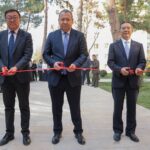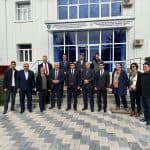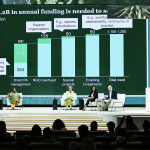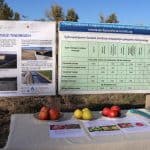On February 10, a meeting of the Central Asian countries after the 28th Conference of the Parties to the United Nations Framework Convention on Climate Change was held in the conference hall of the Central Asian University for the Study of Environment and Climate Change, Green University. The event was dedicated to the theme “Central Asia in the Climate Change Negotiation Process: Outcomes of the UNFCCC COP28 and Plans for the UNFCCC COP29”.
Participants in the meeting were heads of government agencies in the field of ecology from five Central Asian countries, heads of international organizations and diplomatic corps, representatives of NGOs, academics, eco-activists, and the media.
During the event’s opening, Aziz Abdukhakimov, the Minister of Ecology, Environmental Protection, and Climate Change, highlighted the significant efforts and focus the government has put into the industry. This has resulted in a radical transformation in the field of ecology, and the new constitution enshrines everyone’s right to a favorable environment.
– “President of Uzbekistan Shavkat Mirziyoyev proposed several initiatives, including the creation of a climate council, the opening of a national climate center, and the creation of a climate residence. These initiatives reflect decisive actions in the field of combating the effects of climate change”, A. Abdukhakimov pointed out.
– “The contribution of the Central Asian region to climate change is less than 2%, but it is one of the most vulnerable regions to negative consequences. Today, our goal is to discuss the achievements and conclusions of the Central Asian countries from participating in COP-28, as well as to determine a strategy for participating in COP-29. It is necessary to coordinate our efforts”, the minister added.
The first session of the high-level event was devoted to the theme “Shaping climate policy in Central Asia”. Among the participants were Yerlan Nysanbayev, Minister of Ecology and Natural Resources of Kazakhstan; Melis Turgunbayev, Minister of Natural Resources, Ecology, and Technical Supervision of Kyrgyzstan; Bahodur Sheralizod, Chairman of the Environmental Protection Committee of the Government of Tajikistan; and Charygeldi Babanyyazov, Minister of Environmental Protection of Turkmenistan.
During the conversation, the speakers noted the importance of strengthening cooperation in the region, which can facilitate the exchange of experience and the transfer of technologies and resources for adaptation to climate change and mitigation of its consequences. The importance of Central Asia’s role in the climate negotiations process is increasing, which highlights the significance of the region’s voice in the international arena.
It is worth noting that Aziz Abdukhakimov spoke about several ongoing projects under the leadership of the head of state. Among them are the creation of the “International Expo Hub of Climatic Technologies” in the Aral Sea region, the development of an adaptation strategy on the Central Asian climate dialogue platform, the organization of a “Climate Science Forum” with the participation of leading foreign scientists and specialists at the Green University in Tashkent, the holding of the conference “Climate Migration” under the auspices of the United Nations in Uzbekistan in 2024, the development of the Green Employment program in cooperation with the International Trade Organization, and others.
The speakers of the second session, “The Role of International Partners in Building the Sustainable Potential of the Central Asian Region,” were representatives of international organizations: GiZ, USAID, OSCE, ICAT, the European Union, the World Bank, FAO, and UNDP.

























